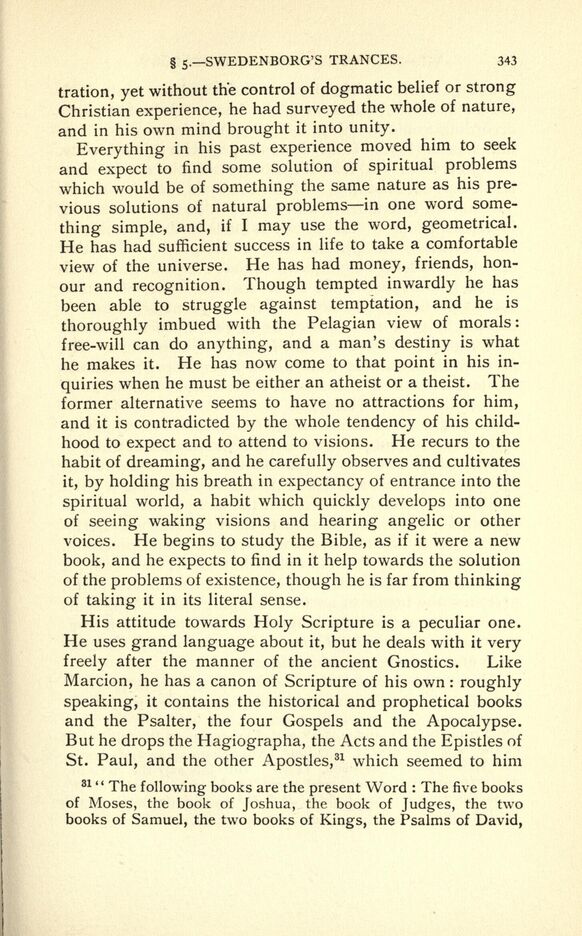
Full resolution (JPEG) - On this page / på denna sida - VII. The Church in the “Time of Freedom” and Period of Neology (1718—1811 A.D.)

<< prev. page << föreg. sida << >> nästa sida >> next page >>
Below is the raw OCR text
from the above scanned image.
Do you see an error? Proofread the page now!
Här nedan syns maskintolkade texten från faksimilbilden ovan.
Ser du något fel? Korrekturläs sidan nu!
This page has never been proofread. / Denna sida har aldrig korrekturlästs.
5 ._SWEDENBORG S TRANCES. 343
tration, yet without the control of dogmatic belief or strong
Christian experience, he had surveyed the whole of nature,
and in his own mind brought it into unity.
Everything in his past experience moved him to seek
and expect to find some solution of spiritual problems
which would be of something the same nature as his pre
vious solutions of natural problems in one word some
thing simple, and, if I may use the word, geometrical.
He has had sufficient success in life to take a comfortable
view of the universe. He has had money, friends, hon
our and recognition. Though tempted inwardly he has
been able to struggle against temptation, and he is
thoroughly imbued with the Pelagian view of morals:
free-will can do anything, and a man s destiny is what
he makes it. He has now come to that point in his in
quiries when he must be either an atheist or a theist. The
former alternative seems to have no attractions for him,
and it is contradicted by the whole tendency of his child
hood to expect and to attend to visions. He recurs to the
habit of dreaming, and he carefully observes and cultivates
it, by holding his breath in expectancy of entrance into the
spiritual world, a habit which quickly develops into one
of seeing waking visions and hearing angelic or other
voices. He begins to study the Bible, as if it were a new
book, and he expects to find in it help towards the solution
of the problems of existence, though he is far from thinking
of taking it in its literal sense.
His attitude towards Holy Scripture is a peculiar one.
He uses grand language about it, but he deals with it very
freely after the manner of the ancient Gnostics. Like
Marcion, he has a canon of Scripture of his own :
roughly
speaking, it contains the historical and prophetical books
and the Psalter, the four Gospels and the Apocalypse.
But he drops the Hagiographa, the Acts and the Epistles of
St. Paul, and the other Apostles,
31
which seemed to him
31 "
The following books are the present Word : The five books
of Moses, the book of Joshua, the book of Judges, the two
books of Samuel, the two books of Kings, the Psalms of David,
<< prev. page << föreg. sida << >> nästa sida >> next page >>